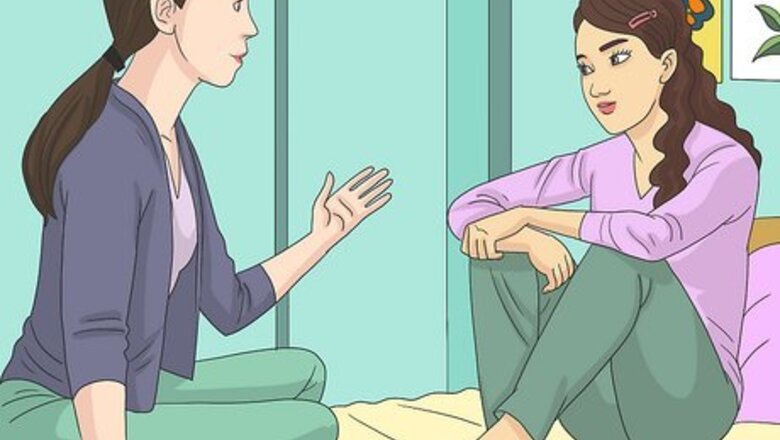
views
Being a Supportive Role Model

Talk openly with the teen. While the teen may seem to ignore you, or be hesitant to share feelings, it's important to open the lines of communication. Discuss your concerns in a calm and loving way. Be compassionate when listening to them respond or fail to respond. The teen may not be willing to open up every time. Consider saying something like, "I noticed a change in your behavior (and then explain what change you've noticed). I wanted to check in with you, and see if you wanted to talk. I know it can be tough to share what you're thinking or feeling. But know that I'm here and ready to listen." Offer up examples of what you struggled with as a teen. Maybe you had difficulties at school, with friends, or your family. Give them advice about how you overcame those challenges or what similarities you and the teen both faced. Try to be patient. Some teens may not open up at first, and it may take some time to gain their trust. Let them know you are there to listen whenever they feel ready to talk.
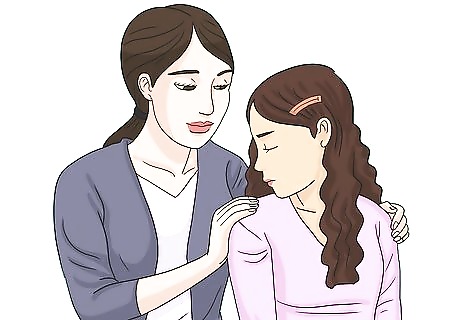
Be a reliable and calm support system. Avoid getting upset or raising your voice if possible. While your troubled teen's actions may cause you to be frustrated or anxious, find ways to show them you are a strong and reliable support system. Be available for them. Avoid over-scheduling activities with other friends or family, and leaving no time to be a reliable support to your teen. Be cool and calm. If you feel that you can't, ask to excuse yourself for a few minutes, and say that you'll come back to this situation when you're calm. Show them how to handle their emotions effectively without offending or hurting others. Be willing to apologize. Teach them it's okay to make mistakes because everyone does from time to time, even you. Emphasize that mistakes are learning opportunities and that making them is a normal part of life.

Listen without judgment. If you see a troubled teen act impulsively or behave strangely, try to listen to their concerns without judgment. Instead of trying to fix all their problems, be a guide and advisor that listens with empathy and kindness. Avoid distractions and maintain good eye contact. To show that you're truly listening, you need to focus on them and only them. Be present and avoid electronic devices that could distract you from a serious conversation. Don't jump in and start telling them what to do. Avoid saying things like, “Well, I know better than you do.” or “I've been on this Earth a lot longer than you.” Your teen may shut down and zone out once you start to act this way. Give them room to say what they want to say, even if it seems silly or petty. For example, let's say the teen just wants to talk about being dissed by a friend for wearing a certain outfit. If that's all they're willing to talk about, at least that's a start. Listen to them with kindness and sincerity because sometimes it's all about small steps. Try not to minimize their concerns. If something matters to them, then it is important.

Keep rules and boundaries for your teen. Even as a teen grows up, it's important to monitor and supervise what they're doing and who they're with. Parental and adult supervision can help to reduce negative and troublesome activities. Just make sure to avoid being too strict or overly protective. Be balanced in your approach to setting rules and boundaries. Give them opportunities to do things independently to show that you trust them. But if or when they break your trust, it is important to have boundaries and consequences. Get your teen involved in setting the rules. By having them participate in how rules and consequences are created, they will be more likely to respect these rules and respect you. For example, you could talk with the teen about what happens if they break curfew. Learn what they think is an appropriate punishment, and focus on coming to a consensus between you. This teaches them accountability and to be responsible for themselves.
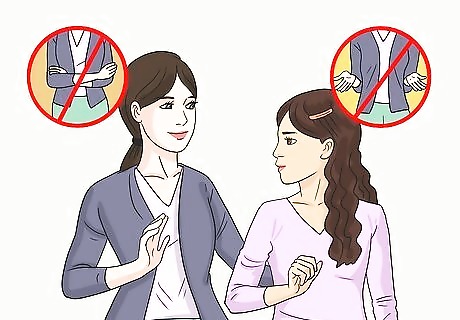
Think about your parenting style. Are you very strict and focused on punishment for every little thing? Do you give a lot of leeway or freedom? Do you feel more overprotective or more relaxed in your approach? Be aware of how your actions may affect your teen's behavior. Set a tone of mutual respect, while also setting rules. Being authoritative may work sometimes, but it must come from a place of love and understanding. As a teen ages, they may pull away from you. Make sure to show them that you're still a strong and reliable presence in their lives. If you show them this, they're more likely to turn to you for help, rather than ignore you.
Teaching Healthy Coping
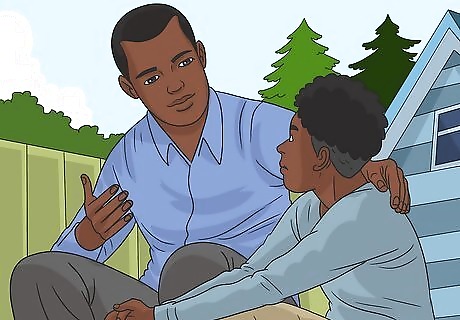
Prioritize time with the teen. Make sure to have quality time with the teen. While they may be hesitant to spend time with you, make a point of doing activities together in the evenings and on weekends. Work on keeping the relationship strong and intact, even as they grow older. You may have many demands from your work, your spouse, your children, your relatives, and friends. Make sure to have one-on-one time with the teen more often, so that they know they are a priority in your life. If you see them acting out, avoiding you, or showing signs of depression, this is not the time to pull away from them. They may be in distress. Make sure to attend events with them, and have them join in on parties and events with other family and friends. Make sure to include rather than exclude them.

Encourage them to find healthy activities to help them cope. If your teen is facing pressures at school, feeling isolated, or lacking guidance in what to do, focus on getting them into activities that will boost their confidence, make them feel worthwhile, and show them they can overcome what they're facing. Consider these healthy activities: Get them involved in extracurricular activities at their school such as joining a sports team, joining band, or theater. Encourage them to use their creative side. Find art, photography, or technical classes available in the community or at school. Identify areas that may interest them but that they've never tried before. Get them involved in groups and afterschool activities that have adult supervision, through school or community programs like those at the YMCA. See if there are youth groups through your place of worship or other community centers that focus on teens who may be struggling with depression, fitting in, or feeling peer pressure. Avoid forcing them to attend, but instead provide encouragement. Volunteering for a cause they care about can help them feel engaged and valued.
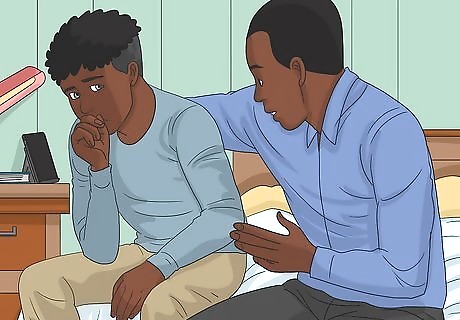
Teach them that it's okay to ask for help. Show the teen that it's not a sign of weakness to ask for help. Show them that utilizing the guidance and support of others is a sign of maturity, growth, and strength. Provide them with examples of how you may have been hesitant to ask for help in the past, and how that may have hurt you in the long run. Show them that it's okay to feel awkward, unsure, or confused from time to time. Provide that emotional reassurance that when they come to you for help, you're ready and non-judgmental.
Finding Professional Help
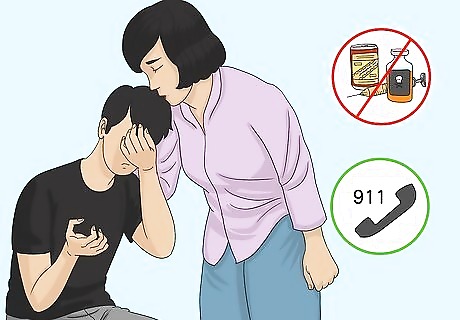
Ensure that the teen is safe from self-harm or harm to others. If the teen has thoughts of suicide, self-harm, or harming others, identify resources to help immediately. Be an advocate for this teen's safety and the safety of others. Notice any warning signs like intense mood swings; destructive habits like throwing things or threatening people; saying things like, "There's no reason to live," or "I just want to die;" repeated alcohol intoxication; drug abuse; or psychotic symptoms. See if the teen is willing to talk with the Suicide and Crisis Lifeline, or call/text yourself on their behalf: http://988lifeline.org/ or 988. A counselor can help to assess the teen's crisis situation and provide options. Consider taking the teen to the nearest emergency room for evaluation, and options for mental health treatment in the community. If there is immediate danger to yourself, the teen, or others, call 9-1-1 and ask for an officer with mental health training. No matter the urgency of the crisis, avoid leaving the teen alone. Make sure that there is an adult supervising them to ensure their safety.
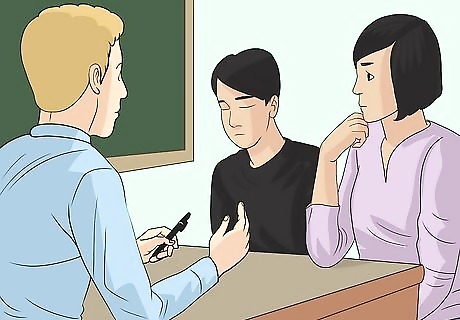
Talk with the school about the teen's behaviors and performance. Be active in monitoring the teen's grades, poor study habits, or difficulties with others at school. Get the teen's perspective on what the issue is, but also reach out the school staff to get guidance about next steps. Be a go-between between the teen and the school, but avoid taking sides. Reach out to the teen's teachers to understand their views of the teen's actions in class and overall academic performance. Contact the school principal or head of school administration to understand any policies related to truancy, failing classes, detention, or other issues that may led to severe consequences. Talk with the school counselor about any issues you have seen at home or after school that are concerning to you. Ask about the different options available in the community to help the teen.
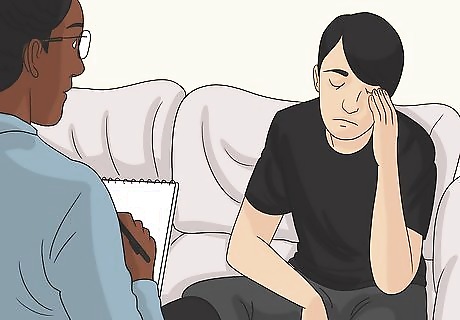
Seek help from a counselor if the behaviors persist or worsen. If your teen continues to act out in anger, be destructive, or has expressed thoughts of self-harm, it is important to get professional help to make living and being with them more manageable. It can be tough and stressful to see a teen who is suffering or continuing to get worse. Find a counselor or counseling center that offers individual and group therapy. Talk with them about the behaviors and concerns you're having. Even if they aren't able to help, they may be able to provide an appropriate referral. Discuss with a mental health professional about behavior therapies and other treatment options. They may be able to recommend a doctor for medical evaluation if needed. For many teens with mood disorders such as depression or bipolar disorder, a combination of medication and therapy is often most effective. Take into account any medications your teen may be on, which may be causing a change in normal behavior.

Reach out to local and national programs that support families and troubled teens. There are many programs available nationwide to assist teens and families with the challenges of growing-up and acting-out. If you have concerns about a teen, be an advocate and identify programs that may help. Encourage the teen to attend programs that may help them find help and confidence. Contact community groups that help at-risk youth. Find mentoring or other activity programs through the Boys and Girls Clubs of America: http://www.bgca.org/ Discuss residential treatment options and other program to help troubled teens and at-risk youth via the Boys Town Hotline: 1-800-448-3000 or http://www.boystown.org/ Identify programs such as wilderness, art, or recreation therapies in your community that help to teach teens to appreciate others and themselves. Talk with the teen's school counselor, community centers, or counseling centers about options for teens.

















Comments
0 comment